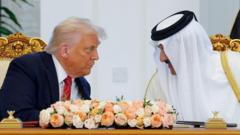The $400 million deal for a Boeing 747-8 intended for the U.S. government has drawn bipartisan backlash, with critics labeling it a bribe while some supporters express unease at the appearance of impropriety.**
Mixed Reactions Across the Aisle: Trump's Qatar Plane Deal Sparks Controversy**

Mixed Reactions Across the Aisle: Trump's Qatar Plane Deal Sparks Controversy**
Trump's proposal to accept a luxury jet from Qatar has ignited dissent among both critics and supporters, raising questions about ethics and transparency.**
In an unexpected twist amid America's ongoing political divisions, President Donald Trump's revelation of a potential deal to accept a luxury private jet from Qatar has prompted a rare moment of unified criticism, cutting across partisan lines. This proposed gift, a Boeing 747-8 valued at approximately $400 million, has incited backlash from both Democratic opponents and some of Trump’s traditional allies, who express concern over the ethical implications of the arrangement.
Critics within the Democratic Party seized upon the news to decry Trump's willingness to engage with the Qatari royal family. Notably, the Democratic National Committee demonstrated its disdain by flying an aircraft over Trump's Mar-a-Lago resort, displaying a banner mockingly dubbed "Qatar-a-Lago." Mainstream conservative commentators have not shied away from criticizing the proposal; Daily Wire's Ben Shapiro called the arrangement "skeezy" and raised alarms over Qatar’s alleged links to terrorism. Even influencers typically aligned with Trump, such as Laura Loomer, have voiced their apprehensions, deeming the deal a "stain" on the president's integrity.
The Qatari government maintains that the jet is part of a government-to-government transaction meant for the U.S. Department of Defense, not a personal gift to Trump. However, concerns persist about the long-term implications of such a gift. Critics point to Trump's prior accusations against Qatar for funding terrorism and express skepticism about whether accepting the aircraft could lead to unintended consequences or serve as a form of influence-peddling.
Despite the backlash, Trump's administration staunchly defends the deal, stating that it is compliant with legal guidelines regarding foreign gifts. The White House communications team reassured the public that all necessary protocols would be observed. In his defense, Trump himself highlighted the gift as a benefit to the nation, likening it to historical donations like France’s gift of the Statue of Liberty.
Yet, within the Republican Party, voices of caution emerge. Senators Rand Paul and Ted Cruz have expressed concern over potential ethical pitfalls and the implications for U.S.-Qatar relations. Conversely, others, such as Senator Tommy Tuberville, have voiced support for the deal, underscoring the allure of a "free" jet amid budgetary constraints.
As the conversation around the Qatar plane deal unfolds, the overarching narrative becomes one of caution and political contention. Despite Trump's adeptness at managing controversy, the prevailing queries on ethics and propriety signal a complicated landscape ahead for the administration as it navigates international relationships intertwined with domestic sentiment.
Critics within the Democratic Party seized upon the news to decry Trump's willingness to engage with the Qatari royal family. Notably, the Democratic National Committee demonstrated its disdain by flying an aircraft over Trump's Mar-a-Lago resort, displaying a banner mockingly dubbed "Qatar-a-Lago." Mainstream conservative commentators have not shied away from criticizing the proposal; Daily Wire's Ben Shapiro called the arrangement "skeezy" and raised alarms over Qatar’s alleged links to terrorism. Even influencers typically aligned with Trump, such as Laura Loomer, have voiced their apprehensions, deeming the deal a "stain" on the president's integrity.
The Qatari government maintains that the jet is part of a government-to-government transaction meant for the U.S. Department of Defense, not a personal gift to Trump. However, concerns persist about the long-term implications of such a gift. Critics point to Trump's prior accusations against Qatar for funding terrorism and express skepticism about whether accepting the aircraft could lead to unintended consequences or serve as a form of influence-peddling.
Despite the backlash, Trump's administration staunchly defends the deal, stating that it is compliant with legal guidelines regarding foreign gifts. The White House communications team reassured the public that all necessary protocols would be observed. In his defense, Trump himself highlighted the gift as a benefit to the nation, likening it to historical donations like France’s gift of the Statue of Liberty.
Yet, within the Republican Party, voices of caution emerge. Senators Rand Paul and Ted Cruz have expressed concern over potential ethical pitfalls and the implications for U.S.-Qatar relations. Conversely, others, such as Senator Tommy Tuberville, have voiced support for the deal, underscoring the allure of a "free" jet amid budgetary constraints.
As the conversation around the Qatar plane deal unfolds, the overarching narrative becomes one of caution and political contention. Despite Trump's adeptness at managing controversy, the prevailing queries on ethics and propriety signal a complicated landscape ahead for the administration as it navigates international relationships intertwined with domestic sentiment.




















